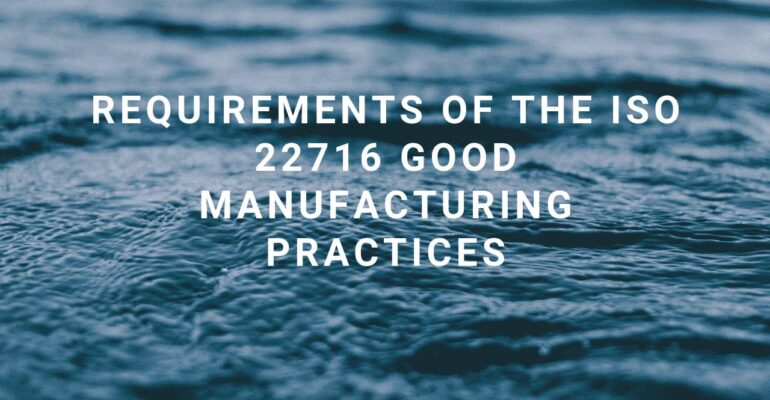What is GMP : Good Manufacturing Practices?
What is GMP: Good Manufacturing Practices?
If you’ve ever wondered how companies ensure the products you use are safe and consistent, you’ve probably stumbled upon the term GMP. But what is GMP, exactly? Let’s break it down in simple terms.
GMP stands for Good Manufacturing Practices, a set of guidelines that industries like pharmaceuticals, food, and cosmetics follow to ensure their products are consistently high in quality and safe for consumers. Think of GMP as a blueprint for making sure every batch of a product meets strict safety and quality standards, no matter where it’s made or who’s making it.
The Purpose of GMP
At its core, GMP is all about protecting people. Whether it’s ensuring a medicine works the way it should, a cosmetic product is safe for your skin, or food is free from contamination, GMP acts as a safety net. It’s like having a quality-control expert looking over every step of the production process, ensuring nothing goes wrong.
But it’s not just about safety. GMP also ensures consistency. Imagine buying your favorite face cream, and one jar is perfect while the next one smells weird or irritates your skin. With GMP in place, companies avoid those inconsistencies, giving you the same reliable product every time.
Why Do We Need GMP?
Good question! Without GMP, manufacturers might cut corners, leading to unsafe or unreliable products. Unfortunately, history is full of examples where poor manufacturing practices caused serious harm. GMP prevents these issues by setting clear rules for how products should be made, handled, and tested.
By following GMP, companies show they care about their customers and are committed to delivering high-quality, trustworthy products. And let’s be honest, isn’t that what we all want when we buy something?
So, to answer the big question, what is GMP? It’s a framework that ensures products are safe, effective, and consistent—giving both businesses and consumers peace of mind. It’s like the unsung hero working behind the scenes to keep us safe!
Why is GMP Important?
Now that we’ve answered the question, “what is GMP,” let’s dive into why it matters so much. Good Manufacturing Practices aren’t just about ticking boxes—they’re about creating products that are safe, reliable, and meet high standards every single time. Whether you’re a consumer or a business owner, understanding why GMP is essential can help you appreciate its impact.
1. Ensuring Product Safety
First and foremost, GMP is all about safety. Imagine buying a product—whether it’s medicine, food, or cosmetics—only to find out it’s contaminated or doesn’t work as intended. Scary, right? GMP ensures that every product you use is safe and free from harmful ingredients or contaminants.
For example, in pharmaceutical manufacturing, GMP requires rigorous testing of raw materials and finished products. This prevents issues like incorrect dosages or dangerous impurities that could harm consumers. It’s like having a safety shield in place for every item that leaves the production line.
2. Maintaining Consistency and Quality
We’ve all had that moment where we buy a product we love, only to find the next batch isn’t quite the same. Maybe it smells different, doesn’t work as well, or even causes irritation. That’s exactly the kind of problem GMP aims to prevent.
With Good Manufacturing Practices, companies follow strict guidelines to ensure that every batch of a product is identical in quality and performance. From ingredient sourcing to packaging, GMP guarantees that what you get today will be the same high-quality product you can trust tomorrow.
3. Building Consumer Trust
Let’s be honest: trust is everything. When companies follow GMP, they show their customers that they take quality and safety seriously. This builds confidence in their brand, which can lead to long-term loyalty.
For consumers, knowing a company adheres to GMP standards means you can feel good about using their products. It’s like a silent promise that they’ve done everything possible to ensure your safety and satisfaction.
4. Ensuring Regulatory Compliance
Here’s another big reason why GMP is crucial: What is the difference between ISO 9001 and GMP? Many countries have strict GMP regulations, especially for industries like pharmaceuticals and food. By following these guidelines, companies not only avoid hefty fines and recalls but also ensure they’re meeting the standards of both local and global markets.
Take the FDA in the United States or the World Health Organization’s (WHO) GMP guidelines, for instance. These regulations are designed to protect public health and ensure that only safe, high-quality products make it to consumers.
5. Reducing Risks and Costs
Non-compliance with GMP can lead to product recalls, customer complaints, or even legal action—all of which can be costly and damaging to a company’s reputation. By following GMP, businesses can avoid these risks and save money in the long run. It’s a smart investment that pays off in more ways than one.
Why It Matters to Everyone
So, why is GMP important? Whether you’re a business ensuring compliance or a consumer looking for quality products, GMP plays a vital role. It’s the backbone of product safety, quality, and trust—making life better and safer for everyone involved.
With GMP, we can confidently say that the products we use are as reliable as they are safe. And in today’s world, that peace of mind is priceless!
The Key Principles of GMP
Now that we know what GMP is and why it’s so important, let’s break it down further. What exactly makes Good Manufacturing Practices work so well? The answer lies in its core principles. These are the rules and practices that ensure every product meets high safety and quality standards. If you’ve ever wondered how GMP works in practice, this section will clear things up.
1. Hygiene and Cleanliness
One of the most essential principles of GMP is maintaining a clean and hygienic environment. Think about it—would you want your medicine or skincare products made in a dusty, unclean facility? Of course not!
GMP requires manufacturers to ensure their facilities, equipment, and personnel follow strict hygiene standards. This helps prevent contamination, which could ruin an entire batch of products or, worse, pose risks to consumers.
For example, workers must wear protective clothing, and equipment must be cleaned regularly. These simple steps go a long way in ensuring product safety.
2. Trained Personnel
A system is only as good as the people running it, and that’s why GMP emphasizes the importance of training. Everyone involved in the manufacturing process must be properly trained in their roles and responsibilities.
From understanding safety protocols to mastering specific tasks, skilled workers are a critical part of making sure GMP is implemented effectively. After all, if someone doesn’t know the rules, mistakes can happen—and in industries like food or pharmaceuticals, those mistakes can be costly.
3. Documentation and Record-Keeping
Here’s a phrase you’ll hear a lot in GMP: “If it’s not documented, it didn’t happen.” GMP requires detailed documentation of every step in the manufacturing process. This might sound tedious, but it’s absolutely necessary.
Records ensure that every product can be traced back to its source. If there’s ever a problem, these records make it easier to identify and fix the issue quickly. Think of documentation as the diary of the production process—it tells the full story of how a product was made.
4. Equipment and Facility Maintenance
Imagine using old, unreliable equipment to make something as critical as medicine or baby formula. Scary, right? That’s why GMP includes strict rules about maintaining equipment and facilities.
All machinery must be regularly inspected and kept in top condition to avoid breakdowns or malfunctions. Facilities must also be designed to support proper workflows, minimizing risks like cross-contamination or mix-ups during production.
5. Quality Control and Testing
Quality control is like the final checkpoint in the GMP process. Before a product leaves the facility, it must be thoroughly tested to ensure it meets safety and quality standards.
This might involve checking the product’s ingredients, appearance, or functionality. For instance, in the pharmaceutical industry, testing ensures that each tablet contains the exact dosage specified on the label. It’s all about making sure the end product is exactly what it’s supposed to be—safe, effective, and reliable.
Why These Principles Matter
When you combine these principles—hygiene, training, documentation, maintenance, and quality control—you get a manufacturing process that runs smoothly and consistently produces high-quality products. These aren’t just rules; they’re the backbone of what GMP is all about: ensuring safety, trust, and reliability in every product.
By following these principles, businesses can avoid errors, protect consumers, and build a reputation for quality. It’s a win-win for everyone!
Industries That Require GMP
Now that we’ve unpacked the principles of Good Manufacturing Practices, let’s talk about where GMP is used. Spoiler alert: it’s everywhere! From the food you eat to the cosmetics you use and the medicines that keep you healthy, GMP plays a vital role in ensuring these products are safe and effective. But why do certain industries need GMP more than others? Let’s dive in.
1. Pharmaceuticals
When it comes to the pharmaceutical industry, GMP is absolutely non-negotiable. Think about it: people rely on medicines to save lives and improve their health. So, there’s no room for error here.
GMP ensures that every tablet, capsule, or liquid medication is manufactured under strict conditions to meet safety and efficacy standards. It covers everything from ingredient quality to proper storage and labeling. By following GMP, pharmaceutical companies protect patients from harmful side effects, contamination, or incorrect dosages.
Without GMP, the risk of unsafe medicines reaching the market would be far too high—and that’s a risk no one wants to take.
2. Food and Beverages
If you’ve ever wondered how your favorite snacks stay fresh and safe to eat, you can thank GMP. In the food and beverage industry, what is GMP all about? It’s about preventing contamination and ensuring consistent quality in the products we consume daily.
From processing raw ingredients to packaging the final product, GMP ensures that food is safe, properly labeled, and free from harmful substances. It’s also the reason food recalls are relatively rare—because most companies follow GMP guidelines to the letter.
Imagine opening a jar of peanut butter only to find something unexpected inside. GMP makes sure that doesn’t happen by requiring rigorous hygiene, testing, and documentation throughout the entire process.
3. Cosmetics
The cosmetic industry also relies heavily on GMP to maintain product safety and quality. Whether it’s a face cream, lipstick, or shampoo, these products are applied directly to your skin or hair—so they need to be safe to use.
GMP in cosmetics focuses on preventing contamination, ensuring ingredient safety, and maintaining proper labeling. For example, a poorly manufactured moisturizer could cause skin irritation or even allergic reactions. By adhering to GMP, cosmetic companies can avoid these issues and deliver products that customers trust.
4. Medical Devices
From surgical tools to diagnostic equipment, the medical device industry must also follow GMP. These devices play a critical role in healthcare, so they need to be reliable and safe for both patients and professionals.
GMP in this field ensures that every device is produced consistently, meets safety standards, and functions as intended. It’s not just about quality—it’s about saving lives.
Why GMP is Critical Across Industries
So, why does GMP matter so much across these industries? It’s simple: the products we rely on daily—whether they’re medicines, food, or cosmetics—directly impact our health and well-being. By implementing GMP, manufacturers can prevent errors, build trust, and ensure their products deliver exactly what they promise.
No matter the industry, the question “what is GMP” always leads back to the same answer: it’s the foundation of safety, quality, and reliability. And that’s something we can all appreciate!
Common Challenges in Implementing GMP
While Good Manufacturing Practices (GMP) are essential for ensuring product safety and quality, implementing them isn’t always straightforward. If you’ve ever wondered why some businesses struggle with GMP compliance, you’re not alone. Let’s explore some of the common challenges companies face when trying to follow these standards and how they can overcome them.
1. Understanding What is GMP
One of the first hurdles for businesses is understanding what is GMP and what it requires. For companies new to manufacturing or operating in industries where GMP is mandatory, the guidelines can feel overwhelming. There are detailed rules about hygiene, documentation, equipment, and more. Without a clear grasp of these requirements, it’s easy to fall short.
The solution? Invest in proper training for your team. When everyone understands the purpose behind GMP and their role in it, compliance becomes much simpler.
2. High Costs of Implementation
Let’s face it: implementing GMP can be expensive, especially for small or medium-sized businesses. From upgrading equipment to training staff and creating detailed documentation, the costs can add up quickly.
However, it’s important to think of these expenses as an investment. Non-compliance can lead to product recalls, fines, or damaged reputation—all of which are far more costly in the long run. Breaking down implementation into manageable steps can help spread out the costs while ensuring steady progress.
3. Keeping Up with Documentation
Remember the GMP principle “if it’s not documented, it didn’t happen”? While documentation is critical for ensuring consistency and traceability, it’s also one of the biggest challenges for businesses. Creating, maintaining, and updating records for every stage of the manufacturing process requires time, effort, and attention to detail.
To stay on top of documentation, businesses can use digital tools or software designed for record-keeping. These tools help streamline the process, making it easier to track compliance and reduce the risk of errors.
4. Adapting to Regular Updates
GMP guidelines aren’t set in stone—they evolve over time to reflect new research, technology, and safety standards. For companies operating in global markets, keeping up with these changes can be a challenge.
The key is staying proactive. Subscribing to industry newsletters, attending workshops, and partnering with GMP consultants can help businesses stay updated and adapt to changes quickly.
5. Consistency Across Teams and Facilities
For companies with multiple facilities or large teams, ensuring consistency can be tough. One location might follow GMP to the letter, while another struggles with compliance. This inconsistency can lead to quality issues or even regulatory penalties.
Regular audits, clear communication, and centralized training programs can help maintain consistency. Making sure everyone is aligned on what GMP entails and why it matters ensures smoother implementation across the board.
6. Resistance to Change
Change is never easy, and implementing GMP often requires significant changes in how a company operates. Employees may resist new procedures, and management might hesitate to invest in upgrades or training.
Overcoming this resistance starts with education. When teams understand what is GMP and how it protects both the company and its customers, they’re more likely to embrace the changes.
Turning Challenges into Opportunities
While implementing GMP comes with its challenges, it’s worth the effort. Each obstacle is an opportunity to strengthen your processes, improve product quality, and build trust with customers.
By addressing these challenges head-on and taking small, consistent steps toward compliance, businesses can unlock the full benefits of Good Manufacturing Practices—and set themselves up for long-term success.
How to Stay Compliant with GMP Standards
Implementing Good Manufacturing Practices (GMP) is one thing, but staying compliant is a whole other challenge. Once you’ve answered the question “what is GMP“ and started building your processes around it, the real work begins—ensuring you maintain compliance day in and day out. Don’t worry, though. With the right strategies, it’s easier than you think.
1. Conduct Regular Audits
Think of audits as health check-ups for your manufacturing processes. They help you spot any issues before they become bigger problems. Regular internal audits are a key part of staying compliant with GMP standards. These audits involve reviewing your processes, equipment, and documentation to ensure everything is up to par.
It’s also a good idea to prepare for external inspections from regulatory authorities. Keeping your processes audit-ready at all times can save you a lot of stress and ensure you’re always in line with GMP requirements.
2. Invest in Ongoing Training
Training isn’t a one-and-done deal when it comes to GMP. Since guidelines and processes can evolve, it’s important to keep your team up to date. Regular training sessions ensure that everyone—from factory workers to management—understands their role in maintaining compliance.
For example, employees should know how to handle raw materials, follow hygiene protocols, and properly document their work. When your team is well-trained, it minimizes mistakes and keeps your operations running smoothly.
3. Use Technology to Streamline Processes
One of the easiest ways to stay compliant with GMP is to leverage technology. Digital tools and software can help you manage documentation, track inventory, and even monitor quality control in real-time.
For example, instead of relying on paper records (which can get misplaced or damaged), you can use software to store and organize all your GMP-related documents. This not only makes compliance easier but also speeds up the process when you need to retrieve records during an audit.
4. Keep Your Documentation in Check
As we’ve mentioned before, documentation is a cornerstone of GMP. To stay compliant, you need to ensure your records are accurate, complete, and up to date. This includes everything from batch production records to cleaning logs and equipment maintenance schedules.
A practical tip? Set up a system where records are reviewed and updated regularly. Whether it’s monthly checks or designated team members responsible for documentation, consistency is key.
5. Perform Routine Equipment Maintenance
Imagine trying to manufacture a high-quality product with outdated or faulty equipment—it’s a recipe for disaster. GMP compliance requires regular maintenance of all machinery and tools used in the manufacturing process.
Create a schedule for inspecting and servicing equipment to prevent breakdowns and ensure everything operates at peak efficiency. Well-maintained equipment not only supports compliance but also helps you produce consistent, reliable products.
6. Stay Updated with Regulatory Changes
GMP isn’t static—it evolves to keep up with advancements in technology and safety standards. Staying informed about updates to GMP guidelines is crucial for ongoing compliance.
To keep up, subscribe to industry newsletters, attend workshops, or join professional associations. Partnering with a GMP consultant can also help you navigate any changes and adjust your processes accordingly.
Why Staying Compliant Matters
Maintaining compliance with GMP standards isn’t just about avoiding penalties—it’s about protecting your reputation and delivering products your customers can trust. By staying proactive and following these steps, you’ll not only meet regulatory requirements but also set your business up for long-term success.
So, what is GMP compliance all about? It’s about building trust, ensuring quality, and consistently doing the right thing. With the right approach, staying compliant becomes less of a challenge and more of a habit—one that benefits your business and your customers alike.
The Benefits of Following GMP
If you’re still wondering why sticking to Good Manufacturing Practices (GMP) is worth all the effort, this section is for you. Complying with GMP isn’t just about following the rules—it’s about unlocking a world of benefits for your business, your customers, and your industry reputation. Let’s break it down.
1. Building Consumer Trust
When customers see that a product is manufactured under GMP standards, it sends a clear message: this product is safe, reliable, and made with care. Whether it’s food, cosmetics, or medicine, GMP compliance builds trust with your audience.
Think about it—would you feel comfortable using a product that doesn’t meet safety and quality standards? Probably not. GMP ensures that your customers can have complete confidence in what they’re buying, and that trust can turn them into loyal, long-term fans of your brand.
2. Ensuring Product Quality
At the heart of what is GMP lies the promise of consistent quality. By following GMP guidelines, manufacturers can produce products that meet the same high standards every single time. This consistency is crucial for maintaining your reputation in a competitive market.
For example, imagine you’re buying your favorite moisturizer, and one batch works perfectly while another causes irritation. That kind of inconsistency could damage your trust in the brand. GMP eliminates these issues by ensuring every product is manufactured under strict quality controls.
3. Reducing Risks
Non-compliance with GMP can lead to serious consequences, including product recalls, legal penalties, or even harm to consumers. Following GMP reduces these risks by creating a solid foundation for safe manufacturing practices.
By preventing errors and contamination, GMP protects your business from costly mistakes and protects your customers from unsafe products. It’s a win-win situation that benefits everyone involved.
4. Gaining Access to Global Markets
If you’re dreaming of taking your products to an international audience, GMP compliance is a must. Many countries require businesses to follow GMP standards before they can sell products in their markets.
For example, pharmaceutical companies looking to export to Europe or the United States must meet strict GMP requirements set by regulatory bodies like the FDA or EMA. By adhering to GMP, you’re not just meeting local regulations—you’re preparing your business for global success.
5. Boosting Operational Efficiency
GMP isn’t just about safety—it’s also about streamlining your operations. By implementing practices like thorough documentation, regular training, and equipment maintenance, GMP helps your business run more smoothly.
Efficient operations save time, reduce waste, and improve productivity, all while ensuring compliance. It’s like having a roadmap for running your manufacturing processes in the most effective way possible.
6. Enhancing Brand Reputation
Reputation is everything in business, and GMP compliance can give your brand a serious boost. When you follow GMP, you demonstrate your commitment to quality and safety, which sets you apart from competitors who might not meet the same standards.
In industries where trust is critical, like food and pharmaceuticals, a strong reputation can be the difference between thriving and struggling. GMP helps you build that reputation by showing your customers and partners that you take their safety seriously.
Why These Benefits Matter
So, why is GMP so important? It’s more than just a set of rules—it’s a framework that ensures your products are safe, your customers are happy, and your business is prepared for long-term success.
By following GMP, you’re investing in more than compliance. You’re building trust, improving efficiency, and setting the stage for growth. And in today’s world, where safety and quality are non-negotiable, that’s a benefit you can’t afford to overlook.
Conclusion: Embracing GMP for a Safer and Better Future
Now that we’ve explored the ins and outs of Good Manufacturing Practices (GMP), it’s clear why they’re so important. But let’s take a moment to reflect on what GMP truly means for businesses, consumers, and industries as a whole. So, what is GMP, really? At its core, it’s about creating a world where products are safe, reliable, and made with care.
The Importance of GMP
Following GMP isn’t just a box to tick—it’s a commitment to quality and safety. From ensuring that every product meets consistent standards to protecting consumers from harmful or faulty items, GMP sets the bar high. For businesses, it’s an opportunity to build trust, reduce risks, and even unlock access to global markets.
Whether you’re in the pharmaceutical, food, or cosmetics industry, GMP provides a roadmap for success. It helps you streamline operations, prevent costly mistakes, and create products you can be proud of.
Making GMP Work for Your Business
Of course, implementing GMP can feel overwhelming at first, but it’s worth the effort. With regular audits, proper training, and a commitment to keeping up with changes, staying compliant becomes second nature. Remember, GMP isn’t just about following rules—it’s about creating a system that benefits everyone involved.
Why GMP Matters for Everyone
As consumers, we often take product safety for granted, but GMP is the reason we can trust the items we use every day. It’s a silent guarantee that someone, somewhere, has done the work to make sure that what we’re buying is safe and reliable.
For businesses, it’s a chance to stand out in a crowded market and show customers that their health and safety come first. And in a world where trust and transparency matter more than ever, that’s a powerful message.
So, the next time someone asks “what is GMP,” you’ll know exactly how to explain it. It’s more than a set of standards—it’s the foundation for building better products, stronger businesses, and a safer future. And that’s something we can all get behind!
Let’s make ISO less about stress and more about success! 🙏
make ISO standards less intimidating and more approachable for everyone.
Whether it’s ISO 9001, ISO 22000, or the cosmetics-focused ISO 22716,
I’ve spent my career turning complex jargon into clear, actionable steps
that businesses can actually use. I’m not here to call myself an expert—I prefer “enthusiast” because I truly love what I do.
There’s something incredibly rewarding about helping people navigate food safety and quality management systems
in a way that feels simple, practical, and even enjoyable.
When I’m not writing about standards, you’ll probably find me playing Piano 🎹, connecting with people, or diving into my next big project💫.
Looking for More Resources on ISO 22716?
If you found this article helpful, explore our premium resources designed to help you achieve ISO 22716 certification efficiently:
- 📦 Complete Documentation Package for ISO/IEC 22716 2017: Get all the essential templates and documents you need for fast, easy implementation.
- 🎓 Online Course on ISO/IEC 22716 2017 : Enroll in our comprehensive training to master the key concepts and practical steps toward certification.
- 📋 ISO/IEC 22716 2017 Checklist: Download our detailed checklist to ensure you’ve covered every step of the process.
These resources are tailored to meet your needs and ensure a smooth certification journey. Explore them today and get one step closer to success!





















